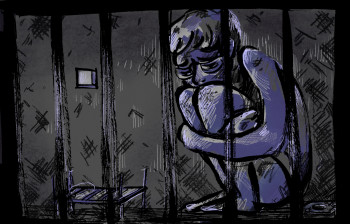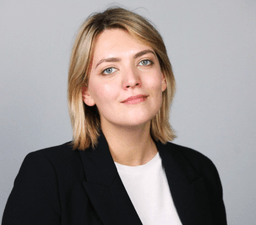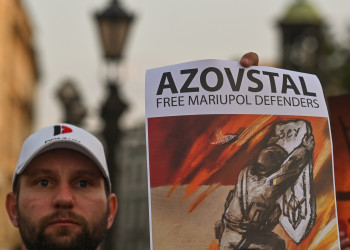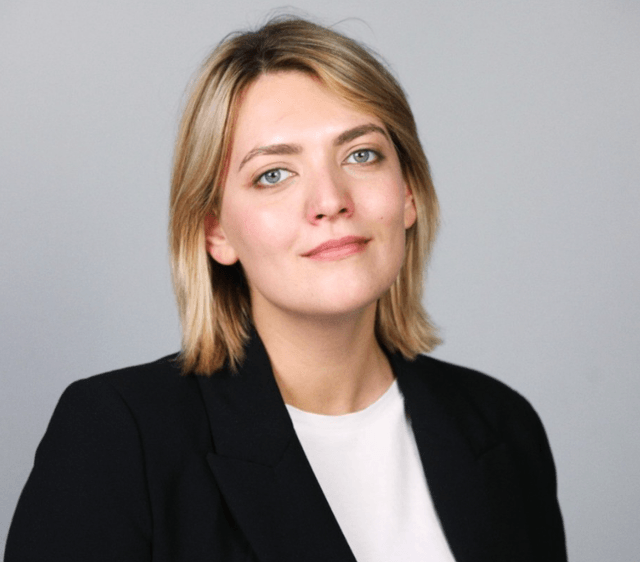Maksym Butkevych, a well-known human rights defender in Ukraine, has had anti-militarist views all his conscious life.
But when Russia launched a brutal full-scale invasion of Ukraine on Feb. 24, he put pacifism aside and joined the Ukrainian army.
"There are times when one needs to be ready to defend what is important," Butkevych said back then.
Over the years, Butkevych has helped hundreds of people fleeing authoritarian regimes and internally displaced Ukrainians from occupied territories.
But now he himself needs help.
When Russian troops took him into captivity in late June, Russian state-controlled media published multiple reports about Butkevych, painting him as a “Nazi” and “anti-Russian.”
There has been no information about his fate since then.
According to Oleh Kotenko, the commissioner for people missing under special circumstances, as of July 11, as many as 7,200 Ukrainian service people have been reported missing, most of whom are in Russian captivity.
Numerous reports from those who returned from Russian captivity describe torture or witnessing torture by beating and, in some cases, electric shock.
read also

Surrender to save lives
Butkevych devoted nearly 20 years of his life to humanitarian activities, including advocating for refugees through the No Borders Project, co-founding the Zmina human rights center, and Hromadske Radio non-governmental media organization.
He also helped multiple victims of Russian aggression since Moscow invaded Ukraine in 2014. Butkevych actively participated in the campaign for the release of Kremlin's political prisoners from Ukraine, including Oleg Sentsov and Oleksandr Kolchenko.
After he volunteered to join the army at the beginning of Russia’s all-out war, Butkevych became a unit commander as he had completed a military course in college. He was first deployed just outside Kyiv. In June, he was deployed to the east, near the city of Sievierodonetsk in Luhansk Oblast.
Some of the war's bloodiest fighting was happening in the area at the time.
By the end of June, Sievierodonetsk had turned from an industrial center into a ghost town of ruins, with nearly 90% of buildings damaged or destroyed, along with most of the city's vital infrastructure, according to Luhansk Oblast Governor Serhii Haidai. The city fell to Russia on June 24.
That very day Butkevych's mother, Yevheniia, 70, had last seen her son. The Russian state-controlled news outlet RIA Novosti posted a video featuring Butkevych alongside other captured Ukrainian soldiers.
According to Yevheniia, Butkevych’s unit got surrounded by Russian troops. When two Ukrainian soldiers went looking for water, they got captured, and Russians used them to lure the rest of the group into a trap.
"It was tough to listen to Maksym," she recalls. "They had to lay down their arms so they would not be shot down like targets in a shooting range. As a commander, he decided to save the lives of the personnel."
Fears grow amid unknown fate
Since Butkevych was taken captive, Russian state-controlled media outlets published dozens of articles accusing him of being a Nazi unit commander and an anti-Russian nationalist. Other accusations were even more random: They included him being a British spy, being responsible for organizing anti-government protests in Belarus, and attempting to overthrow Kazakhstan's state system.
At first, the activist's family, as advised by Ukraine’s Armed Forces and Defense Ministry, remained silent about his capture, fearing publicity could potentially harm him.
However, as the number of reports about Butkevych continued to grow daily, suggesting he was considered "a big fish” for Russia, his relatives decided to go public in mid-July.
Tetiana Pechonchyk, head of the board of the ZMINA human rights center, believes it was necessary to make Butkevych's case public and share the truth about his human rights work.
"Amid this shameful propaganda campaign, there was a high risk of torture and ill treatment against him or fabrication of some criminal case against him," she told Krym Realii media outlet.
Friends and colleagues of Butkevych, who previously were members of the board of Amnesty International's Ukraine section, denounced Russian media reports as propaganda.
"It's so Orwellian," said Yevheniia Polshchykova, a former student activist, as quoted by the New York Times. "They literally take an anti-fascist, a human rights defender, and call him a Nazi."
As Russian dictator Vladimir Putin used the so-called "de-Nazification" to justify the invasion of Ukraine, Ukrainian prisoners of war accused of being "Nazi" may be at higher risk of getting tortured or even killed.
In late July, Ukraine's Defense Ministry's Intelligence Directorate accused Russia of deliberately attacking a prisoner camp in occupied Olenivka, killing at least 53 Ukrainian prisoners of war. Many of the victims were members of the Azov Regiment, which the Russian media has been portraying as a Nazi battalion.
Butkevych's family hasn't had any news about him for almost two months.
"There has never been a worse period in my life," his mother Yevheniia said.
The activist’s parents are concerned he could have been singled out from other prisoners of war so Russia could set up a show ”trial" to charge him with terrorism, or other false accusations. It would make it impossible for Butkevych to participate in a prisoner exchange.
But his family hopes that the fact that Russian media keep making reports about their son means that he is at least still alive.
"We really need to find out where he is," his mother said.












